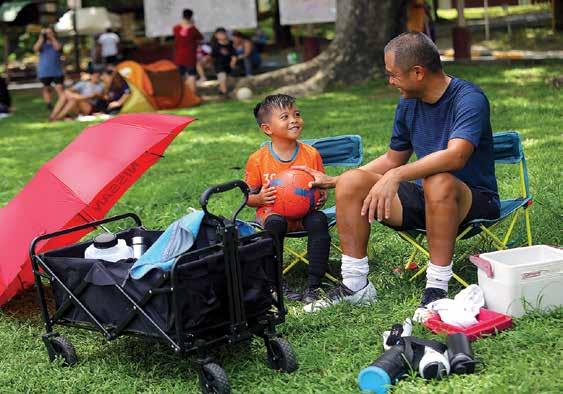
5 minute read
International rights group calls out US for allowing hospitals to push millions into debt
by Noam N. Levey KFF Health News
HUMAN Rights Watch, the nonprofit that for decades has called attention to the victims of war, famine, and political repression around the world, is taking aim at U.S. hospitals for pushing millions of American patients into debt.
Advertisement
In a new report, published June 15, the group calls for stronger government action to protect Americans from aggressive billing and debt collection by nonprofit hospitals, which Human Rights Watch said are systematically undermining patients’ human rights.
“Given the high prevalence of hospital-related medical debt in the US, this system is clearly not working,” concludes the report, which draws extensively on an ongoing investigation of medical debt by KFF Health News and NPR.
The report continues: “The U.S. model of subsidizing privately operated hospitals with tax exemptions in the hope that they will increase the accessibility of hospital care for un- and underinsured patients allows for abusive medical billing and debt collection practices and undermines human rights, including the right to health.”
Nationwide, about 100 million people — or 41% of adults — have some form of health care debt, a KFF survey conducted for the KFF Health News-NPR project found. And while patient debt is being driven by a range of medical and dental bills, polls and studies suggest hospitals are a major contributor.
About a third of U.S. adults with health care debt owed money for hospitalization, KFF’s polling found. Close to half of those owed at least $5,000.
About a quarter owed $10,000 or more.
The scale of this crisis — which is unparalleled among wealthy nations — compelled Human Rights Watch to release the new report, said researcher Matt McConnell, its author.
“Historically, Human Rights Watch has been an organization that has focused on international human rights issues,” he said.
“But on medical debt, the U.S. is a real outlier. What you see is a system that privileges a few but creates large barriers to people accessing basic health rights.”
Hospital industry officials defend their work, citing hospitals’ broader work to help the communities they serve. “As a field, hospitals provide more benefit to their communities than any other sector in health care,” Melinda Hatton, general counsel at the American Hospital Association, wrote in a response to the Human Right Watch report. Federal law requires private, tax-exempt hospitals — which make up more than half the nation’s medical centers — to provide care at no cost or at a discount to low-income patients. But reporting by KFF Health News and others has found that many hospitals make this aid difficult for patients to get.
At the same time, thousands of medical centers — including many tax-exempt ones — engage in aggressive debt collection tactics to pursue patients, including garnishing patients’ wages, placing liens on their homes, or selling their debt to third-party debt collectors.
Overall, KFF Health News found that most of the nation’s approximately 5,100 hospitals serving the general public have
ONE APIA Nevada, a leading advocacy organization representing Nevada’s Asian American, Native Hawaiian, and Pacific Islander (AANHPI) communities, reflects on the conclusion of an eventful legislative session and two special sessions, commending the hard-won successes of state legislators, including those in the AANHPI Legislative Caucus. While there were many wins for Nevada’s AANHPI community it is essential to address the missed opportunities resulting from the vetoed policies and legislation by the Governor, which would have significantly improved the lives of hardworking AANHPI Nevadan families. Notably, AB246 and AB251, both language access bills, were among those vetoed. "Language equity encompasses more than just providing materials for somebody in a different language," says One APIA Nevada Acting Executive Director Eric Jeng. "Language access empowers our communities to make informed decisions without concerns about the accuracy or source of the information provided. Without official resources, our communities rely on word-of-mouth, online translators, or unofficial translated sources, often leading to mistranslations and misinformation."
Outlined below are the missed opportunities that One APIA Nevada will continue to address
AB246: this legislation sought to surpass the federal mandate set by the Voting Rights Act Section 203 by requiring counties to provide translated election materials to a broader range of communities. Despite the strong community support for electoral language access, it is disappointing that the Governor overlooked this critical issue.
However, One APIA Nevada remains committed to collaborating with local counties, particularly Clark County, as they voluntarily begin to provide translated materials in Chinese for the 2024 Election. We have already initiated conversations with the Clark County Registrar’s Office on implementation and outreach to the Chinese-speaking community.

AB251: This bill aimed to ensure pharmacies offer translated prescription labels in the most commonly spoken languages among Limited English Proficient Nevadans.
One APIA Nevada will persist in working alongside legislators and stakeholders to implement language access parameters for prescription medications effectively.
AB319: The proposed legislation sought to provide universal free school breakfasts and lunches for Nevada students.
One APIA Nevada firmly believes that no student in our state should experience hunger due to financial constraints. We will continue advocating for equitable access to nutritious meals for all pupils.
AB366: This bill proposed revisions to the Task Force for the Keep Nevadans Working Act.
One APIA Nevada stands as a strong supporter of the Keep Nevadans Working Act and the UNLV law clinic. We firmly believe in sustained investments in resources that benefit immigrant communities.
SB419: This legislation aimed to expand Medicaid coverage for minors, irrespective of their immigration status. Access to healthcare is a fundamental right, and our most vulnerable communities often bear the burden of inequitable policies.
One APIA Nevada firmly opposes any barriers based on immigration status and believes everyone should have equal access to healthcare.
“While we express our disappointment over the missed opportunities to enhance the livelihood of AANHPI families in Nevada directly, one APIA Nevada remains unwavering in our commitment to advocating for the needs of the AANhPI community. Our ongoing priorities include championing language access, promoting healthcare equity, and ensuring equal access to education,” the organization said. g
Bongbong Marcos to sign bill for...
Fund and that is all true, that’s all true, you must worry about that,” he said.
"Kung corrupt ang ilagay niyo diyan, corrupt talaga ‘yan. Mawawala ang pera. Kung mahusay ang ilalagay mo diyan, ay lalaki at lalaki ‘yan at magagamit natin ‘yung pondo na ‘yan,” Marcos added.
(If you put someone corrupt there, it would really be corrupt. Money will be lost. If you put a good one in there, the fund will grow and we can use that fund.)
The president, however, stressed that good management is key to keeping the money safe.
“Perhaps we are looking in the wrong direction. The key to the success of any fund, hedge fund, pension fund, sovereign fund, investment fund, is the management. Of course all of these things can happen, we’ve seen them happen before because the management chose for it to happen, these scandals that we see from other places. On the other hand, we see examples of really successful funds and really, the difference is management,” he pointed out in a mix of English and Filipino.
The president said the MIF must be independent from the government, noting that he suggested to the House of Representatives to remove from the bill government officials originally designated to be part of the MIF’s board.
“One of the first changes that even I proposed to the House was to remove the President as part of the Board, to remove the Central Bank chairman, the Department of Finance, because it has to operate as an independent fund, wellmanaged professionally,” Marcos said.
Marcos had certified as urgent the Maharlika bill in both chambers of Congress, paving the way for the proposed measure to breeze through the legislative branch.
In the House of Representatives, 279 voted in favor of the bill while in the Senate, 19 senators approved it. g





